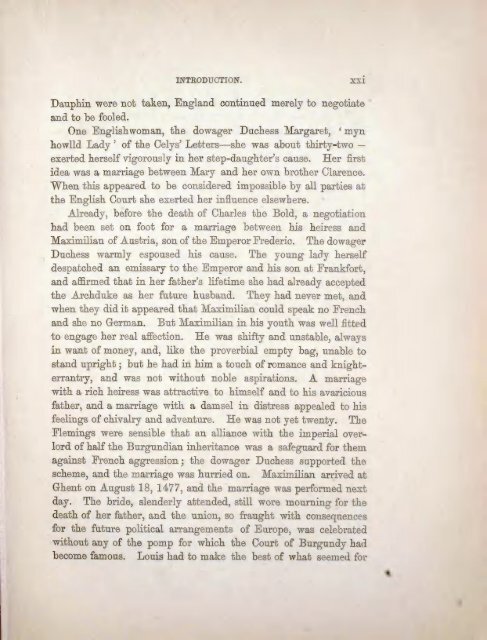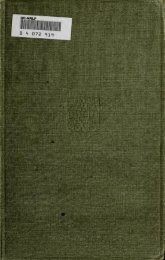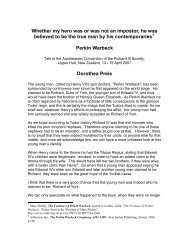- Page 1 and 2: ^i*-. A** '(»H4t; i««H * i . > .
- Page 5: " " '
- Page 9: THE CELY PAPEES SELECTIONS FROM THE
- Page 13 and 14: INTRODUCTION THE Cely Papers, from
- Page 15 and 16: INTRODUCTION. VI l The whole family
- Page 17 and 18: INTRODUCTION. Newcastle, and thence
- Page 19 and 20: INTRODUCTION. XI an obvious conveni
- Page 21 and 22: INTRODUCTION. X11I moreover, charge
- Page 23 and 24: INTRODUCTION. regranted to the desc
- Page 25 and 26: INTRODUCTION. XV11 a prospect of ma
- Page 27: INTRODUCTION. nevertheless took thr
- Page 31 and 32: INTRODUCTION. XXlll defaulter. Simi
- Page 33 and 34: INTRODUCTION. XXV back to Calais in
- Page 35 and 36: INTRODUCTION. XXVll would not make
- Page 37 and 38: INTRODUCTION. agent, the Duchess, b
- Page 39 and 40: INTRODUCTIOX. XXXI to the last he h
- Page 41 and 42: INTRODUCTION. ' xxx - - . to France
- Page 43 and 44: INTRODUCTION. XXXV senger carrying.
- Page 45 and 46: INTRODUCTION. XXXVll Lewes, but the
- Page 47 and 48: INTRODUCTION. XXXIX on the 17th. Bu
- Page 49 and 50: INTRODUCTION. xli Robert Turney Joh
- Page 51 and 52: INTRODUCTION. a sermon at Paul's Cr
- Page 53 and 54: INTRODUCTION. to move him to go a-c
- Page 55 and 56: INTRODUCTION. xlvii poaching affair
- Page 57 and 58: xlix APPENDIX I CONTEMPORARY COINAG
- Page 59 and 60: APPENDIX I. li 1456, but also the n
- Page 61: APPENDIX If. liii Railing or Balyng
- Page 64 and 65: 2 THE CELY PAPERS. N° xxxj ij sacc
- Page 66 and 67: 4 THE CELY PAPERS 4 Jhesu Ryght rev
- Page 68 and 69: 6 THE CELY PAPERS. Jhesu Ryght whor
- Page 70 and 71: 8 THE CELY PAPERS. the sodears at C
- Page 72 and 73: 10 THE CELY TAPERS 10 Ry chard Cely
- Page 74 and 75: 1 -> I w THE CELY PAPERS. 12 Rychar
- Page 76 and 77: 14 THE CELY PAPERS co wn sell Syr m
- Page 78 and 79:
16 THE CELY PAPERS. dayly as for al
- Page 80 and 81:
18 THE CELY PAPERS, it be Ixxx11 or
- Page 82 and 83:
20 THE CELY PAPERS. iiij crounys at
- Page 84 and 85:
22 THE CELY PAPERS. Jhesu 22 Whelbe
- Page 86 and 87:
24 THE CELY TAPERS. Wylliam Cely de
- Page 88 and 89:
26 TEE CELY TAPEKS. 26 fly chard Ce
- Page 90 and 91:
28 THE CELY PAPERS yow and thankys
- Page 92 and 93:
30 THE CELY PAPERS. tys zed byt of
- Page 94 and 95:
32 THE CELY PAPERS. hath be in Cott
- Page 96 and 97:
34 THE CELY PAPERS. 30 O Rychard Ce
- Page 98 and 99:
THE CELY PAPERS. me and he says tha
- Page 100 and 101:
38 THE CELY PAPERS. a grane & payer
- Page 102 and 103:
"10 THE CELY rAl'EKS. This letter c
- Page 104 and 105:
42 THE CELY PAPERS. Item in the Ann
- Page 106 and 107:
44 THE CELY PATERS. The Costum and
- Page 108 and 109:
46 THE CELY PAPERS. 44 Rychard Cely
- Page 110 and 111:
48 THE CELY PAPERS. dysplesyd therw
- Page 112 and 113:
50 THE CELY PAPERS. he saw howe fat
- Page 114 and 115:
52 THE CELY PAPERS. becawsse of the
- Page 116 and 117:
51 THE CELY TAPERS aull iij sortys
- Page 118 and 119:
56 THE CELY PAPERS. F to you at thy
- Page 120 and 121:
58 THE CELY PAPERS. howssys synyd t
- Page 122 and 123:
60 THE CELY PAPERS. be God thys sam
- Page 124 and 125:
02 THE CELY PAPERS. blessynges Syr
- Page 126 and 127:
64 THE CELY PAPERS. and zeve hover
- Page 128 and 129:
66 THE CELY PAPERS. shall resseywe
- Page 130 and 131:
68 THE CELY PAPERS. 62 Anno Jhesn W
- Page 132 and 133:
70 THE CELY PAPERS me to my fader a
- Page 134 and 135:
72 THE CELY TAPERS. markyd wfc my m
- Page 136 and 137:
74 THE CELY PAPERS. send them at th
- Page 138 and 139:
76 THE CELY PAPERS. Item in the Mar
- Page 140 and 141:
78 THE CELT TAPEKS. 70 Rychard Cely
- Page 142 and 143:
80 THE CELY PAPERS. whryttyng frowm
- Page 144 and 145:
82 THE CELY PAPERS. Bwshaya or hell
- Page 146 and 147:
84 THE CELY PAPERS. yt ys soo as it
- Page 148 and 149:
86 THE CELY TAPERS. hatne offyrd vi
- Page 150 and 151:
88 THE CELY PAPERS. he hawlie any w
- Page 152 and 153:
00 ' THE CELY PAPERS. imderstonde t
- Page 154 and 155:
92 THE CELY PAPERS. frome yow ys to
- Page 156 and 157:
1)4 THE CELY PAPERS. ij'1 qa iij po
- Page 158 and 159:
96 THE CELY TAPERS. Ser yf hyt wold
- Page 160 and 161:
nil- 86 Jl hesu M1nijciiijxxij I *"
- Page 162 and 163:
100 THE CELY PAPERS and all the wol
- Page 164 and 165:
102 -THE CELY PAPERS. xiiij day of
- Page 166 and 167:
104 THE CELY PAPERS. for them x as
- Page 168 and 169:
106 THE CELY PAPERS. 91 Rychard Cel
- Page 170 and 171:
108 THE CELY PAPERS. thys tyme but
- Page 172 and 173:
110 THE CELY PAPERS. here no more u
- Page 174 and 175:
1 1 2 THE CELY PAPERS. London & Ypy
- Page 176 and 177:
114 THE CELY PAPERS. made vj oblyga
- Page 178 and 179:
116 * THE CELY PAPERS. schall bryng
- Page 180 and 181:
118 THE CELY PAPERS. I hawe redd an
- Page 182:
120 THE CELT PAPERS. V but Allmyght
- Page 185 and 186:
THE CELY PAPERS. 123 I schawll seke
- Page 187 and 188:
TIIK CELY PAPERS. 12 100 "Jbesu Tl
- Page 189 and 190:
THE CKI.Y PAPERS. 127 Item v rynysh
- Page 191 and 192:
THE CELY IMPKRS. Jhesu Tl 111 Eight
- Page 193 and 194:
THE CELY TAPERS. Ml 113 Probably wr
- Page 195 and 196:
THE CELY PAPERS. 133 defend wher tr
- Page 197 and 198:
THE CELY PAPERS. 135 yowre costom &
- Page 199 and 200:
THE CELY PAPERS. 137 Phellypp and t
- Page 201 and 202:
THE CELY PAPERS. 139 schall be scho
- Page 203 and 204:
THE CELY PAPERS. Ml and a letter to
- Page 205 and 206:
THE CELY PAPERS. 1 J-J in hondd I h
- Page 207 and 208:
THE CELY PAPERS. No more unto yowre
- Page 209 and 210:
THE CELY PAPERS. 147 Charllys and s
- Page 211 and 212:
THE CELY PAPERS, 149 ben sowyr syk
- Page 213 and 214:
THE CELY TAPERS. 151 w1 Fraunce tli
- Page 215 and 216:
THE CELY PAPERS. 153 my nostes how
- Page 217 and 218:
THE CELY TAPERS. 10") here but as f
- Page 219 and 220:
THE CELY PAPERS. Will Cely can tell
- Page 221 and 222:
THE CELY PAPERS. 15(J 128 " Jnesu "
- Page 223 and 224:
THE CELV PAPERS. 1G1 raynyth I be>e
- Page 225 and 226:
THE CKLY PAPERS. On ike Dorse, in a
- Page 227 and 228:
THE f'ELY PAIT.IO. lyinge be the wa
- Page 229 and 230:
THE CELY PAPERS. 1G7 the land takyt
- Page 231 and 232:
THE CELY PAPERS. 169 Fraunce and to
- Page 233 and 234:
THE Ci.LY 1'APKHS. 171 m.-isfvrschy
- Page 235 and 236:
THE ('ELY PAPEl;.- 173 F.o. Item fo
- Page 237 and 238:
THE CELY PAPERS. 17: Item be my god
- Page 239 and 240:
THE CELY PAPERS. 177 Item I pd to W
- Page 241 and 242:
THE CELY PAPERS 17'J Item for gone
- Page 243 and 244:
THE CELY PAPERS. 181 Item pfl be hy
- Page 245 and 246:
THE CELY PAPERS. 183 Item the xxj d
- Page 247 and 248:
THE CELY PAPERS. 185 Item pd be me
- Page 249 and 250:
THE CELY PAPERS. ]87 F. 14. -m Sent
- Page 251 and 252:
THE CELY PAPERS. 189 Item vj playsy
- Page 253 and 254:
On vSonday master leffetenawnt - ij
- Page 255 and 256:
Till- CI-LY PAFKKS. 1'.' 143 Robard
- Page 257 and 258:
THE CELY PAPERS. 1 Jl. Item the sam
- Page 259 and 260:
THK CELY PAPERS. 197 145 Jhesus Mar
- Page 261 and 262:
THE CELY PAPERS. 199 Costes upon Ma
- Page 263 and 264:
THE. CELT PAPERS. 201 Item a remeua
- Page 265 and 266:
THE CELY PAPERS. 2'Jo 148 My ful tr
- Page 267:
THE CELY PAi'KKS. 205 ys a scherewd
- Page 270 and 271:
208 THE CELY PAPERS. organ (Bergen
- Page 272 and 273:
210 THE CELY PAPERS. Fedyan, Fethya
- Page 274 and 275:
212 THE CELT PAPERS. Newclay, Bache
- Page 276:
214 THE CELY PAPERS. Wesylton, 68 W
- Page 282 and 283:
1 -' , EG . Vil "?; - .*V4\ , - ' '
- Page 287:
E- ARCH 1VF















